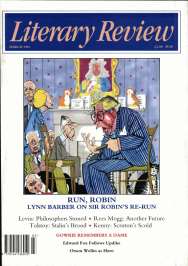Marybeth Hamilton
‘John’ Thomas Unmasked
Race-ing Justice, En-gendering Power: Essays on Anita Hill, Clarence Thomas and the Construction of Social Reality
By Toni Morrison (ed)
Chatto & Windus 475pp £12.99
It seemed, at the time, like the most surreal of fictions: US Senators quoting The Exorcist, debating pubic hairs in Coke cans and discussing the exploits of Long Dong Silver. Unfortunately, it was all too real, and its consequences no less than disastrous: a lifetime Supreme Court appointment for Clarence Thomas after the most tumultuous confirmation hearings in history, in which law professor Anita Hill accused him of sexual harassment.
Over a year later, the hearings threaten to fade into dim memory as an inexplicably bizarre moment. This collection aims to forestall that prospect. Edited and introduced by Toni Morrison, Race-ing Justice, En-gendering Power comprises eighteen essays by a notable array of black and white academics, all opponents of Thomas’s confirmation, which delve beneath the episode’s seemingly singular surface and untangle its roots in American history. Taken together, they make clear how much more was at stake than simply one man’s accession to the Supreme Court.
The episode began on the July 3 1991, when George Bush announced his nominee for the Supreme Court post vacated by retiring justice Thurgood Marshall, the first black member in the Court’s history and a liberal jurist of great distinction. Bush named Clarence Thomas, a longtime Reagan favourite, formerly Assistant

Sign Up to our newsletter
Receive free articles, highlights from the archive, news, details of prizes, and much more.@Lit_Review
Follow Literary Review on Twitter
Twitter Feed
Under its longest-serving editor, Graydon Carter, Vanity Fair was that rare thing – a New York society magazine that published serious journalism.
@PeterPeteryork looks at what Carter got right.
Peter York - Deluxe Editions
Peter York: Deluxe Editions - When the Going Was Good: An Editor’s Adventures During the Last Golden Age of Magazines by Graydon Carter
literaryreview.co.uk
Henry James returned to America in 1904 with three objectives: to see his brother William, to deliver a series of lectures on Balzac, and to gather material for a pair of books about modern America.
Peter Rose follows James out west.
Peter Rose - The Restless Analyst
Peter Rose: The Restless Analyst - Henry James Comes Home: Rediscovering America in the Gilded Age by Peter Brooks...
literaryreview.co.uk
Vladimir Putin served his apprenticeship in the KGB toward the end of the Cold War, a period during which Western societies were infiltrated by so-called 'illegals'.
Piers Brendon examines how the culture of Soviet spycraft shaped his thinking.
Piers Brendon - Tinker, Tailor, Sleeper, Troll
Piers Brendon: Tinker, Tailor, Sleeper, Troll - The Illegals: Russia’s Most Audacious Spies and the Plot to Infiltrate the West by Shaun Walker
literaryreview.co.uk